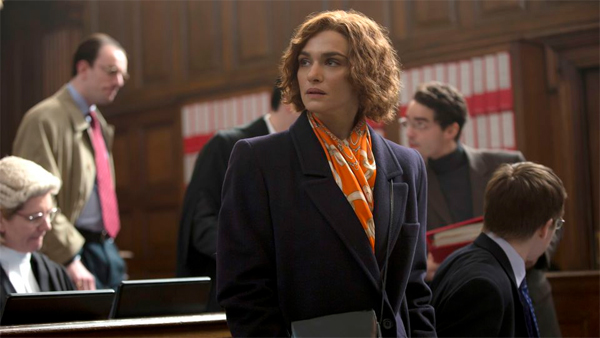Denial Review
If 2016 proved anything to me, it’s that facts are as fragile as fine china. The idea that something is irrefutable doesn’t matter to people with the right mixture of ignorance, prejudice, and/or intention, and so admirers of historical and scientific truth are forced to debate where one shouldn’t be necessary.
And so we have Denial, a film in which one character remarks that not all opinions are equal. Some things are incontrovertibly true — like the melting polar ice caps, the Black Death, and more importantly for the purposes of director Mick Jackson’s film, the Holocaust.
Based on a true story, the film follows Holocaust scholar and author Deborah Lipstadt (Rachel Weisz) who’s being sued for libel by a British Hitler “historian” David Irving (Timothy Spall). In one of her books, she labels Irving a Holocaust denier. He sues for libel, but in the British justice system, the burden of proof in libel suits is on the defendant, meaning Lipstadt is guilty until proven innocent. This is a challenging wrinkle for her attorneys — chief among them Richard Rampton (Tom Wilkinson) and Anthony Julius (Andrew Scott) — because they must demonstrate that Irving willfully manipulated historical evidence to espouse his abhorrent views while keeping the actual Holocaust and its survivors off the stand for fear of legitimizing his perspective.
Denial is first and foremost a courtroom drama. At least 50 percent of its running time is spent in front of a judge, and as one might expect (for the purposes of producing real or manufactured dramatic tension), there are good days and bad ones. Irving’s case is paper thin, as he preys upon minor and insignificant inconsistencies to further his racist and anti-Semetic agenda. Still, it takes painstaking preparation and fascinating debate skills to build a case in Deborah’s defense. Richard’s clever unwillingness to look the plaintiff in the eye is particularly interesting.
Denial gets a little lost in trying to develop its deep cast of attorneys when it doesn’t seem particularly necessary or interesting. We get to know Richard and, to a lesser extent, Anthony. But the film is primarily about Deborah and David, and attempts to explore the motivations behind the defense team’s tertiary characters never gets off the ground.
That time would have been better spent, say, at Auschwitz, where the film’s most overwhelming scene takes place. Richard insists on going there with Deborah to see the physical layout of the space and collect similar evidence. Deborah doesn’t appreciate his clinical approach on such hallowed ground, and for the viewer, it’s hard to take sides — not just because they both make decent points, but also for the punch packed by the visual experience itself. By and large, Jackson’s directorial approach is clinical, but it’s hard to argue against the emotional impact of this sequence and its placement in the film.
Rachel Weisz is as reliable as ever in a very juicy role as the outspoken author. She feels a real weight on her shoulders to represent the pain of not only those who survived Auschwitz, but also those who didn’t. This isn’t a case she asked for, but it’s one she must win, and giving over all of her trust to these strangers, as talented as they appear on their resumes, is extremely difficult.
Timothy Spall is her equal. The performance doesn’t ask as much of him — he’s just a scoundrel through and through — but you’d be hard-pressed to find an actor, British or otherwise, who’s capable of contorting himself physically, vocally, and morally the way Spall does here and in other pictures, as well.
Denial sort of slid under my radar — it didn’t get a ton of buzz out of the 2016 fall festivals, nor did it earn a true wide release — it’s a straight-down-the-middle drama that totally satisfied. It doesn’t punch above its weight much, but nor does it ever punch below its weight. In other words, I can’t say it ever blew me away, but its missteps are extremely few and far between, and for that reason, it wouldn’t surprise me to see it snag a couple nominations come awards season, despite its fairly low profile. And it wouldn’t upset me either. It’s a film worthy of both acclaim and a wider audience.

















One Response to Denial Review